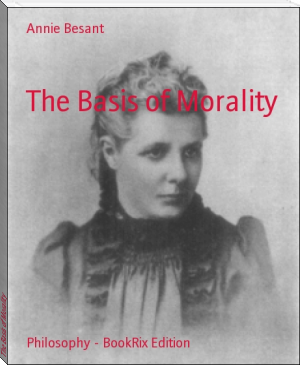author - "Annie Besant"

e, and will do better next time. The trouble, the pain, we havebrought on ourselves by our ignorance, we note, as showing that we havedisregarded a law, and we profit by the additional knowledge in thefuture.Thus understanding conscience, we shall not take it as a basis ofmorality, but as our best available individual light. We shall judgeour conscience, educate it, evolve it by mental effort, by carefulobservation. As we learn more, our conscience will develop; as we actup to the highest we

closely resemble that of a refined product of a coarse idea, and the only method of deciding between degeneration and evolution would be the examination, if possible, of intermediate and remote ancestors. The evidence brought forward by believers in the Wisdom is of this kind. They allege: that the Founders of religions, judged by the records of their teachings, were far above the level of average humanity; that the Scriptures of religions contain moral precepts, sublime ideals, poetical

imself familiar with it. If he were studying only the body, and desired to understand its activities, he would have to classify its tissues at far greater length and with far more minuteness than I am using here. He would have to learn the differences between muscular, nervous, glandular, bony, cartilaginous, epithelial, connective, tissues, and all their varieties; and if he rebelled, in his ignorance, against such an elaborate division, it would be explained to him that only by such an

ich you require, you can evade those you do not require, you can utilize those you need, and thus you can bring about the result that nature, without that application of human intelligence, cannot so swiftly effect.Take it, then, that Yoga is within your reach, with your powers, and that even some of the lower practices of Yoga, some of the simpler applications of the laws of the unfolding of consciousness to yourself, will benefit you in this world as well as in all others. For you are really

e, and will do better next time. The trouble, the pain, we havebrought on ourselves by our ignorance, we note, as showing that we havedisregarded a law, and we profit by the additional knowledge in thefuture.Thus understanding conscience, we shall not take it as a basis ofmorality, but as our best available individual light. We shall judgeour conscience, educate it, evolve it by mental effort, by carefulobservation. As we learn more, our conscience will develop; as we actup to the highest we

closely resemble that of a refined product of a coarse idea, and the only method of deciding between degeneration and evolution would be the examination, if possible, of intermediate and remote ancestors. The evidence brought forward by believers in the Wisdom is of this kind. They allege: that the Founders of religions, judged by the records of their teachings, were far above the level of average humanity; that the Scriptures of religions contain moral precepts, sublime ideals, poetical

imself familiar with it. If he were studying only the body, and desired to understand its activities, he would have to classify its tissues at far greater length and with far more minuteness than I am using here. He would have to learn the differences between muscular, nervous, glandular, bony, cartilaginous, epithelial, connective, tissues, and all their varieties; and if he rebelled, in his ignorance, against such an elaborate division, it would be explained to him that only by such an

ich you require, you can evade those you do not require, you can utilize those you need, and thus you can bring about the result that nature, without that application of human intelligence, cannot so swiftly effect.Take it, then, that Yoga is within your reach, with your powers, and that even some of the lower practices of Yoga, some of the simpler applications of the laws of the unfolding of consciousness to yourself, will benefit you in this world as well as in all others. For you are really




